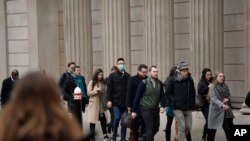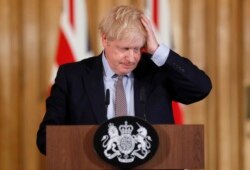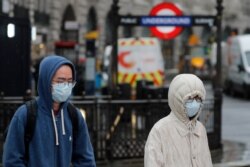Britain’s chief medical officer briefed lawmakers Thursday amid an expected surge in confirmed cases of coronavirus, saying the country is moving from a "containment" phase to one focused on "delaying" the spread, in a bid to avoid high peaks of infections that could overwhelm healthcare services.
But confusion was prompted later when Downing Street officials briefed the media, saying the British government is still focused on containment and did not want to move prematurely to implement ramped-up measures that would have broad economic and social impact.
The chief medical officer, Chris Whitty, warned that Britain’s national health service could run out of intensive care beds at the peak of a coronavirus outbreak, with half the country’s cases expected to occur in a three-week period. He told lawmakers there is now a “very slim to zero” chance of halting the virus globally and in Britain.
He said moving from containment to delay would not immediately change the government’s response, but the elderly will ultimately be advised to stay away from others during the peak of an outbreak, similar to warnings that the Italian government issued Wednesday in its effort to battle the spread of the novel coronavirus.
In Italy there was dismay Thursday when it emerged that a 55-year-old has died from the virus — breaking the pattern of the virus killing only the elderly. Of the more than 100 deaths in Italy so far, all have been between 63 and 95-years-old and had underlying pre-existing illnesses. The 55-year-old’s death — as well a 61-year-old doctor succumbing to the virus — have broken that pattern. Neither were known to have any serious pre-existing conditions.
“We have moved from a situation where we are mainly in contain, with some delay built in, to we are now mainly delay,” Whitty said. “I think we should work on the assumption it is here, on very low levels, at this point in time.”
He said a peak is expected in about two months. Britain now has 90 confirmed cases of infection. But privately medical officials say they think there may be many cases that have gone unreported.
“One of the things which is clear, if you model out the epidemic, is you will get 50 percent of all the cases over a three-week period and 95 percent of the cases over a nine-week period, if it follows the trajectory we think it’s likely to. If all of those were spaced out on the NHS over two or three years, that would be easily manageable, but it’s the fact they are so heavily concentrated,” he said.
British medical officials say they are not convinced by the Italian strategy of closing down schools and universities to halt the virus. And they have a different view on the fatality rate from the Italians and the World Health Organization. They say they are confident that the death rate of the virus would be no higher than one percent. On Tuesday World Health Organization officials say the mortality rate for COVID-19 is at 3.4 percent globally, higher than previous estimates of about two percent.
Chinese data has found the elderly to be much more vulnerable, with death rates rising to nine percent in people over 80-years-old.
Some medical experts say, though, calculating the "case-fatality-ratio" is tricky.
“It is surprisingly difficult to calculate the death rate, during an epidemic,” said John Edmunds, a professor at the Center for the Mathematical Modeling of Infectious Diseases, London School of Hygiene & Tropical Medicine. “This is because it takes some time to die. In the case of COVID-19, the time between onset of disease and death is quite long — two to three weeks or more - so the number of cases that you should divide by is not the number of cases that we have seen to this point, but the number of cases that there were a few weeks ago. Estimating what fraction of the cases might be reported is very tricky,” he added.
Also he noted not all cases of infection will be reported because only mild symptoms are suffered.
“If there are many more cases in reality, then the case-fatality-ratio will be lower,” he told the Science Media Center website.
For the British government — much with their counterparts in European states affected by the outbreak — it is a difficult challenge to try to halt the spread of the virus and prepare for the worst while seeking to allay public alarm. While tamping down talk of moving from a containment phase to one focused on delay, British officials are also making it clear that a spread will prompt more draconian responses.
Among those possible responses in Britain would be the likely closing down of parliament. Downing Street advisers and officials at the Palace of Westminster, which houses both the House of Commons and the House of Lords, have been having discussions whether to suspend sittings of the legislature from next month until September. The fear is that the virus could spread quickly in the building because of the large number of people who visit it.
Earlier this week the government unveiled its battle plan for different stages of the spread of the virus. The plan would include banning sporting events and mass gatherings, closing schools, suspending some public transportation and urging businesses to encourage employees to work from home.
Prime Minister Boris Johnson added some confusion Thursday by telling reporters that some of his science and medical advisers were doubtful about the effectiveness of some of the measures being considered, if infections surge. What they “are telling me is, actually, slightly counter-intuitively, things like closing schools and stopping big gatherings don't work as well perhaps as people think in stopping the spread,” he said.






